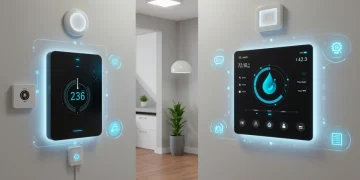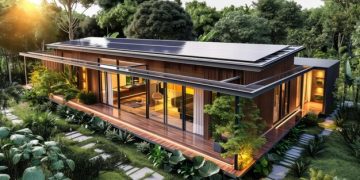Smart Homes: Will Tech Boost Your Property Value by 10% in 2025?
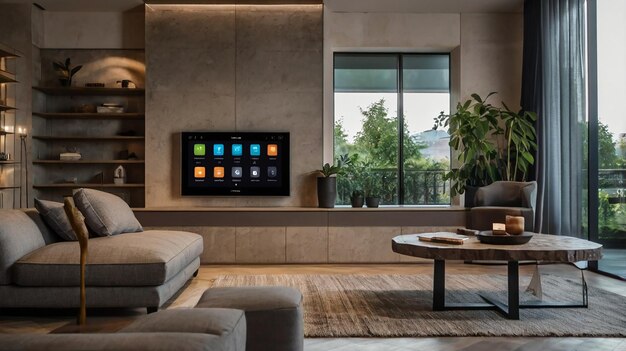
Smart home technology is projected to significantly impact property values, with potential increases of up to 10% in 2025 due to enhanced convenience, security, and energy efficiency that appeal to modern homebuyers.
Investing in smart home technology is becoming increasingly common, but how will smart home tech impact your property value by 10% in 2025? Let’s explore the potential for boosting your property value through smart home integration, helping you understand if these upgrades are a worthwhile investment.
Understanding the Rise of Smart Home Technology
Smart home technology is no longer a futuristic fantasy; it’s a present-day reality rapidly transforming how we interact with our living spaces. Before considering the impact on property values, understanding the rise and integration of these technologies is crucial.
These systems are not merely trendy gadgets but are evolving into essential features that enhance the functionality, security, and energy efficiency of homes.
Smart homes are becoming increasingly popular due to their ability to simplify daily tasks, provide enhanced security measures, and contribute to energy savings. As technology advances, smart home devices become more accessible and integrated, further driving their adoption.
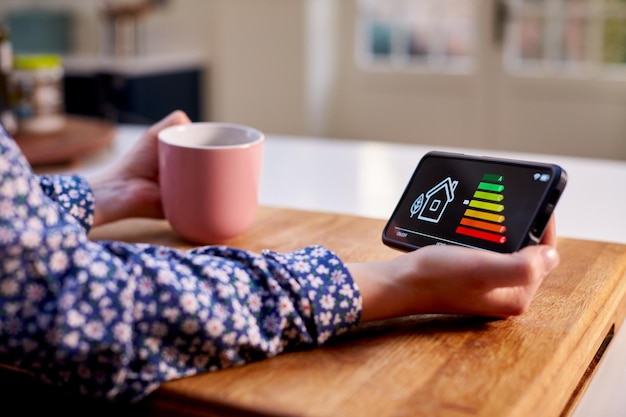
Key Components of Smart Home Systems
Understanding what makes a home “smart” involves recognizing the various technologies contributing to its intelligence and functionality.
- Smart Security Systems: These systems include features like smart locks, video doorbells, and surveillance cameras that enhance home security and provide homeowners with remote monitoring capabilities.
- Smart Lighting Solutions: Automated lighting systems allow homeowners to control lighting remotely, set schedules, and adjust brightness, improving energy efficiency and creating ambiance.
- Smart Climate Control: Smart thermostats enable homeowners to regulate temperature settings, optimize energy usage, and create customized comfort levels through automated schedules and remote access.
- Entertainment Systems: Integrated entertainment systems, including smart TVs, sound systems, and media streaming devices, offer seamless access to entertainment content and enhance the home theater experience.
The increasing demand for homes equipped with smart technologies reflects a broader societal shift towards convenience, efficiency, and connectivity.
The Current State of the Real Estate Market and Smart Homes
To predict the future impact of smart home technology on property values, we must first examine the current state of the real estate market and the existing demand for smart homes. The real estate landscape is continuously evolving, with homebuyers increasingly prioritizing modern amenities and technological features.
Understanding the current market trends and consumer preferences is critical when assessing the value proposition of smart home investments.
Consumer Preferences and Demands
Homebuyers today are tech-savvy and digitally connected, often seeking homes equipped with smart features that align with their lifestyles. This demand is largely driven by the desire for convenience, security, and sustainability.
- Millennials and Gen Z: Younger generations are particularly drawn to smart home technology due to their familiarity and comfort with digital innovations. These demographics often prioritize homes equipped with smart features, viewing them as essential rather than optional.
- Eco-Conscious Buyers: With growing environmental awareness, many homebuyers are seeking energy-efficient homes that minimize their carbon footprint. Smart home technology, like smart thermostats and lighting controls, aligns with these values, making properties more appealing to eco-conscious buyers.
- Luxury Home Market: In the luxury real estate sector, smart home technology is increasingly becoming a standard expectation. High-end properties often feature advanced automation systems, offering enhanced security, comfort, and convenience for discerning buyers.
The real estate market is highly competitive, and properties with enhanced features, like smart home technology, often stand out and command higher prices.
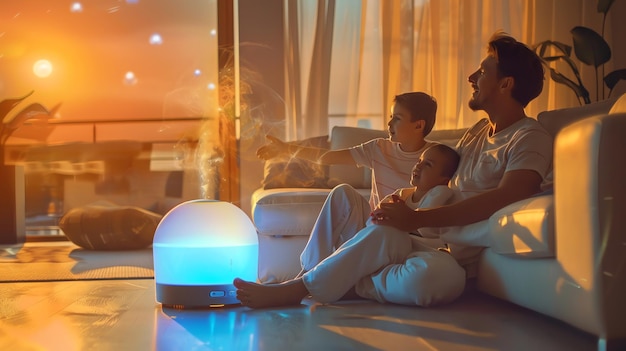
Projecting the 10% Increase: How Smart Tech Adds Value
Predicting a 10% increase in property value from smart home technology in 2025 requires careful analysis. This is based on current adoption rates, market trends, and the perceived value of these technologies by homebuyers. Several factors contribute to the increasing value proposition of smart homes.
It should be noted that property values are also affected by location, size, condition, amenities, comparable sales, and overall market conditions.
Energy Efficiency and Cost Savings
One of the critical factors driving the value of smart home technology is its ability to enhance energy efficiency and reduce utility costs. Smart thermostats, lighting controls, and automated shades can optimize energy usage, leading to significant savings for homeowners.
- Smart Thermostats: These devices learn homeowners’ temperature preferences and adjust accordingly, reducing energy waste and optimizing comfort. Studies have shown that smart thermostats can save homeowners up to 10-12% on heating and cooling costs annually.
- Smart Lighting: Automated lighting systems can be programmed to turn off lights in unoccupied rooms, reducing energy consumption. LED bulbs and dimming capabilities further contribute to energy savings.
- Water Management: Smart irrigation systems and leak detectors can help conserve water and prevent costly water damage. These technologies optimize watering schedules based on weather conditions and alert homeowners to potential leaks, reducing water waste and utility bills.
Enhanced Security and Safety Features
Another significant value driver is the enhanced security and safety offered by smart home systems.
Smart locks, video doorbells, and surveillance cameras provide homeowners with peace of mind and remote monitoring capabilities, enhancing overall home security.
Convenience and Lifestyle Enhancements
The convenience and lifestyle benefits offered by smart home technology also play a significant role in increasing property value.
Potential Challenges and Considerations
While the outlook for smart home technology and property values is promising, it’s important to acknowledge potential challenges and considerations. Property is also affected by the age of the property, lot size and potential for future development.
Homebuyers need to be prepared to do some research, and potentially pay more for the security aspect of their properties.
Privacy and Security Concerns
One of the primary concerns surrounding smart home technology is the potential for privacy breaches and security vulnerabilities. Smart devices collect vast amounts of data about homeowners’ habits and preferences, raising concerns about data security and privacy.
Addressing these concerns requires robust security measures, including encryption, secure data storage, and regular software updates.
Interoperability and Compatibility Issues
Another challenge lies in the interoperability and compatibility of different smart home devices. With various manufacturers and platforms in the market, ensuring seamless integration and communication between devices can be complex.
To mitigate these challenges, homeowners should consider purchasing devices that adhere to industry standards and support open protocols, allowing for greater interoperability.
Cost and Installation Barriers
The initial cost of installing smart home technology can be a barrier for some homebuyers. The cost of purchasing and installing smart devices, as well as potential subscription fees for monitoring and maintenance services, can add up quickly.
Homeowners should carefully evaluate their budget and prioritize smart home upgrades that offer the greatest value and return on investment.
Preparing Your Home for the Smart Tech Boom
To maximize the potential increase in property value from smart home technology, homeowners should take proactive steps to prepare their homes for the smart tech boom. This involves strategic planning, careful product selection, and professional installation to ensure seamless integration and optimal performance.
Selecting the right smart home technologies is essential for maximizing property value and enhancing overall living experience.
Future-Proofing Your Home
Investing in smart home technology is a strategic move that can significantly enhance property value in the coming years so you need to future proof your property.
- Prioritize Energy Efficiency: Focus on smart thermostats, lighting controls, and automated shades to reduce energy consumption and utility costs. Highlight these features in property listings to attract eco-conscious buyers.
- Enhance Security Features: Install smart locks, video doorbells, and security cameras to provide homeowners with peace of mind and remote monitoring capabilities. Emphasize security features in property listings to appeal to safety-conscious buyers.
- Invest in Entertainment Systems: Create a seamless entertainment experience with integrated smart TVs, sound systems, and media streaming devices. Showcase these features in property listings to attract tech-savvy buyers.
Working with Professionals
Proper installation and setup are critical for ensuring the optimal performance and reliability of smart home technology.
Homeowners should work with qualified professionals to install smart home devices, configure network settings, and integrate systems seamlessly. Professional installation ensures that smart home technology is properly optimized, reducing the risk of technical issues and maximizing property value.
| Key Aspect | Brief Description |
|---|---|
| 💡Energy Efficiency | Smart thermostats and lighting reduce energy costs. |
| 🔒Security Features | Smart locks and cameras enhance home safety. |
| 🏡 Lifestyle Convenience | Automation simplifies daily tasks and enhances comfort. |
| 💰 Property Value | Smart tech can increase home value by up to 10% by 2025. |
Frequently Asked Questions
▼
Yes, many experts believe it can! Potential homebuyers are increasingly drawn to houses with integrated smart technology, particularly systems that promote energy efficiency and enhanced security. These features can set your property apart and boost its appeal.
▼
Prioritize energy-efficient solutions liks smart thermostats, smart lighting, and efficient water management systems. Security features, such as smart locks and surveillance cameras, are also highly valued as they offer peace of mind and convenience.
▼
Always use strong, unique passwords for all devices, and keep your devices’ firmware updated to patch any security vulnerabilities. Consider using a separate network for IoT (Internet of Things) devices to isolate them from your primary network.
▼
Smart home systems can be expensive to install. Also, technology can quickly become obsolete, which may require more upgrades every few years. Remember to focus on long-term and cost-effective solutions.
▼
The timeline depends on the technology you choose and market demand. Energy-efficient upgrades may be an immediate benefit through reduced utility bills. Security features increase the appeal to potential buyers, while broader market factors also have an impact.
Conclusion
As we look to 2025, investing in smart home technology presents a compelling opportunity to increase property value. By focusing on energy efficiency, security, and convenience, homeowners can enhance their living spaces and attractiveness to potential buyers, setting their homes up for significant appreciation in the near future.


